一天傍晚,我开完会后回到了手术室。外科医生Levine正等着找我谈话,她抱怨我们科的一位老资历医生不愿意给她的病人做麻醉,理由是这个病人年纪太大、身体情况太差。
于是我来到这位病人D先生的候诊室。进了门,我看见病人的太太在房间里踱来踱去。一见到我,她停了下来,马上认出了我,并且当场哭了起来。几个月以前,我曾经使用我自己设计的一种麻醉技巧,为D先生的鼻窦内窥镜--泪道手术做过麻醉。不幸的是,病人在睡眠中将上次手术中置留的引流管拔了出来,导致感染复发。我问候了他们俩,又握了病人的手,然后将老太太双手合在我的手之间。老太太脸上挂着泪花和微笑,兴奋地说:“上帝听到了我的祈祷,他有救了。我们信任你”。于是,像上次一样,那一天我又再次顺利地帮这位病人渡过了手术难关。
要获取病人的信任,并不总是轻而易举的,尤其在刚开始接受住院医生培训的时候,更是如此。仪表、姿态和口音,有时候会给我们这些外国医学院毕业生带来劣势。有些人还会因为文化差异的冲突而碰到麻烦。这种“偏见之墙”并不是什么新鲜事,事实上,无时无处不在。
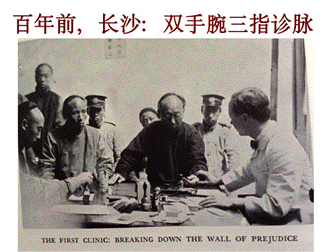
1905年当湘雅创始者胡美医生抵达中国时,他对中国几乎是一无所知。在《道一风同》这本书中,他描述到当时的长沙人是如何不相信“开刀的洋医”,也不喜欢将“一根硬梆梆的怪东西放在口里”。在前往长沙的轮船上,他抓住了第一次与中国人交谈的机会,了解中国当时的政局。到达长沙后,他聘请了当地一位老师教了他近一年中文,尤其注意学会了怎样说话,才能让病人接受他。但是,有一次他还是吓跑了一位来自浏阳的道台,因为他只给那位道台先生的右手把了脉,而不知道中医要求给病人的双手腕都把脉,还将硬梆梆的温度计塞在他的口中。这件事发生之后,他又学习了王叔和的脉诊。
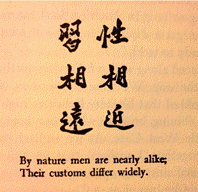
此外,胡美医生还学习了中国的文化和传统,尊重并欣赏中国传统习俗、以及人类共同的人性。最为重要的是,他对中国和中国人民都怀有一颗诚挚的爱心,无论是绅士还是农民,也无论是颜福庆医生、还是他的信使,或者车伕。就这样,用尊重和爱心,他逐渐冲破了“偏见之墙”,赢得了众多的人心;并且通过与中国人民和政府的密切合作,在中国创立了第一所现代化医院和医学院。这,也就是你我有今天的原因。
由于来美国之前我一直生长在一个单一文化环境中,因此,在美国做临床工作的早期,我常常发觉自己对文化的多元性和冲突缺乏敏感和认识。做实习医生时的某一天,我们在急诊室抢救一位女病人,我俯过身去帮助一位站在病人另一侧的护士,却被护士一把推开。很久以后我才意识到,当时我太靠近病人的身体,而这在美国是不礼貌的。这样的细节问题我在中国时是从未想过的。我也意识到,要做一个好医生,不仅需要医学知识和技能,还得知道怎样去接触病人,与病人建立良好的职业关系。而这种互相尊重的医患关系在中国几乎完全不一样。如何赢得病人的信任对于每一个医生永远都是一种挑战。这一点,对于我们麻醉医师而言,在人工诱导病人失去知觉之前,尤为困难和重要。
在住院医生培训期间,我利用一切机会观察其他医务人员如何与病人互动,学习人际交往和沟通的技巧,比如握手、眼神交流、身体语言、幽默感,琢磨如何进行对话、而避免独白;我听到过、也尝试过一些美妙动听的基于市场推销的交际技巧,比如:用一个动人的故事来树立你的信誉,创造一个顺畅的就医经历,提供病人所寻求的答案,宣讲一个品牌的声音。
然而,通过不断的临床实践之后我才意识到,在这些浮于表面的交往背后,应该而且必须有更深入、更重要的东西,那就是一颗呵护之心。这颗心给每一个人,无论是病人还是同事,都予以尊严和尊敬;这颗心要倾听病人的顾虑和恐惧,并总是为病人的最大利益着想。说到底,一个好医生毕竟不同于一个成功的推销员,因为医生并不是在、也不应该促销商品;相反,医生是在呵护,呵护人类的身体和灵魂。尽管当今的科学技术加快了通信和信息交流的速度,在某些方面有助于医疗的实施,但是我们千万不要忘记,是我们的心才真正将人们连接在一起,不论肤色和口音,也不管时间和空间。只有当你身边的每一个人,病人也好,同事也好,都能感受到、体验到你的同理心和责任感,你才真正冲破了“偏见之墙”,而赢得了病人的信任。病人也会用他们的理智与情感来接纳你的口音。
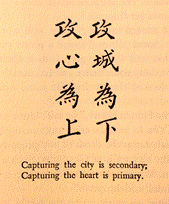
至于前面提到的D先生,他的确年迈体衰:87岁高龄长期身患高血压、糖尿病、肥胖、肺病、睡眠呼吸暂停综合征,曾经有过心肌梗塞和中风。反复的感染导致他眼睛疼痛、总是流泪,既睡不好又看不清。对于麻醉医师来说,这种情况下最大的担忧是病人可能承受不了手术的刺激或者麻醉的副作用。多数麻醉医师都不愿意承担这样的风险,这也就是这位病人两次都被拒绝的原因。然而,通过与病人、病人妻子以及外科医生的真诚的交流,我体会到了病人夫妇俩最为关心的是生活质量,对此我尤为尊重。拥有了病人的信任,我感到有责任竭尽所能帮助这二位老人改善生活质量;同时也愿意与他们一道承担风险,尽管其他医生可能不会愿意。与此同时,采用我多年临床实践中独创的一种麻醉气道管理技术,我又有效地降低了这个风险。
胡美医生设立了一个高标准。他职业生涯中最好的二十一年工作生活在中国,学习其语言和文化,用他的知识和技术为其服务。他赢得了长沙人民和中国人民的尊敬和信任,最终创立了一个他心目中的医院和医学院:一个“以教学和科研的最高标准为准则、临床和教育兼顾、中国人民又觉得是属于自己的”医学中心,并将这份最珍贵的礼物留给了中国人民,留给了你我。今天,尽管不是每一个人都有那种资源,但是我们都能努力去继承他和他同道的事业遗产,在每天的平凡工作中都以尊重、信任和同理心去呵护我们的病人,赢得病人的信任。
To Gain the Trust of Our Patients
Address Given at the Centennial Xiangya Overseas Celebration
Gary Zhou,’78
YaleUniversitySchoolof Medicine
One late afternoon after a meeting, I returned to the OR where I found surgeon Dr. Levine waiting to talk to me. She complained to me that one of my senior colleagues was refusing to anesthetize her patient Mr. D, who was deemed to be “too old and sick”.
When I walked into the waiting room, I found Mrs. D., the patient’s wife, pacing back and forth. She stopped immediately when she saw and recognized me, and burst into tears. A few months ago I had taken care of Mr. D for an operation on his tear duct through sinus endoscopy. While sleeping, however, he had pulled out the drainage tubing placed during the last surgery, and it had gotten infected again. I greeted both of them, holding her hands after shaking his, and she said to me, with a smile and tears on her face, “God answered my prayer; he is saved. We trust you.” That day, I took good care of Mr.D, like I did the first time.
Trust has not always been so easily gained, particularly in the early days when I started my residency training. The appearance, body language, and accent of foreign medical graduates, can sometimes, if not always, put us at a disadvantage. Some foreign medical graduates get into trouble because of cultural conflicts. The wall of prejudice, however, is not new and exists everywhere.
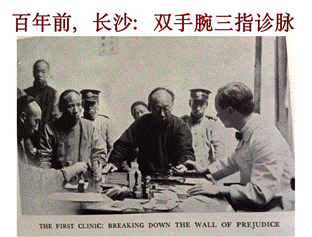
In 1905 when Dr. Edward Hume, co-founder of Xiangya, arrived inChangsha, he knew almost nothing aboutChina. His bookDoctors East Doctors Westdescribes how the people inChangshadid not trust a foreign doctor to “cut with the knife,” or even to “put a strange hard thing (thermometer) inside their mouth.” On board thesteamertoChangsha, he grabbed the first opportunity to speak with an English-speaking Chinese gentleman, in order to get first hand information onChina’s politics. Once Dr. Hume arrived inChangsha, he hired aChangshateacher and spent a year learning Chinese, drilling the sentences he needed to “approach patients acceptably.” Then he learned how traditional Chinese doctors would take a patient’s pulse, after scaring away a gentrymemberby taking his pulse on “one wrist only” and by measuring his temperature with a “strange hard” oral thermometer.
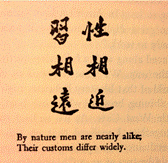
Dr. Hume also learned a great deal about Chinese culture and tradition; he learned to understand the medical remedies, to respect and to appreciate ancient social customs and rituals, and to share common humanity. Most of all, he loved China and its people, from gentry to poor farmers, from Dr. F. C. Yen(Yan Fuqing,颜福庆) to Mr. Li, the letter carrier and rickshaw man. This was how he eventually won the hearts of many, and through the cooperation with Chinese people, launched the modern hospital as well as the first university medical school inChina. This was also how you and I made it to this point today.
Having grown up in a uniform society, I often found it difficult during the early days of my practice to deal with the cultural diversity and conflict in this country. One day during my internship, while taking care of a young female patient in the ER, I reached over the patient to help the nurse who was on the other side, only to be pushed away. It took me a long time to realize that I was too close to the patient’s chest, one of those “minor details” doctors inChinawould never have to worry about. I also realized that, to be a good doctor, not only do I need the knowledge and skills, but I also have to know how to approach each patient and quickly establish a good rapport. Such a mutual-respect relationship was also new to me as I had never experienced before I came to this country. While gaining the trust of our patients is a constant challenge every physician faces, it is uniquely true and especially difficult right before a patient undergoes artificially induced loss of consciousness.
During my residency, I took every opportunity to observe how others would interact with patients, learning communication and interpersonal skills such as firm hand shaking, eye contact, body language, humor, and engaging dialogue and avoiding monologue. I have also heard of and even tried some fancy techniques based on sales and marketing, such as building your reputation with a compelling story, creating a seamless care experience, delivering the information your patients are already searching for, and speaking with one brand voice.
However, only through practice did I realize that behind all these surface-level actions and interactions, there has to be something deeper and more important — that is, a caring heart that treats each and every person, patients and colleagues alike, with respect and dignity; a heart that listens to and addresses the patient’s concerns and fears; and a heart that always considers the patient’s best interests. Ultimately, what distinguishes a good physician from a successful sales person is that: physicians are not selling — instead we are caring, body and soul. Today as technology speeds up the communication and the exchange of information, which improves the care process in certain ways, we must not forget that it is our hearts that really connect people, regardless of our skin color or accents, and irrespective of time and space. Only when everyone around you, your patients as well as your colleagues, can feel your empathy and your sense of responsibility, will you have knocked down that wall of prejudice and gained the trust of your patients. With their open minds and warm hearts, they will not mind your accent.
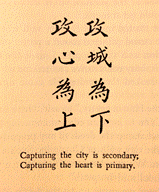
As for Mr. D, he was truly “old and sick”: he was 87, had high blood pressure, diabetes, obesity, sleep apnea and lung disease, and had suffered a heart attack and stroke before. The recurring infection caused pain and constant tearing, and as a result he could not sleep well or see clearly. For an anesthesiologist, the concern was that he might not be able to tolerate the stress from the surgery or the side effects of anesthesia due to his poor health status. This is the consequence most anesthesiologists would not be willing to risk, and this was the reason he was refused twice by my colleagues. However, following an honest and sincere conversation with the patient, his wife and the surgeon, I understood and appreciated what mattered most to the patient and his wife — that is, the quality of life. With their trust, I felt obligated to do what I could to improve the quality of life for both of them; and I was willing to undertake the risk with them, a risk that other anesthesiologists did not want to take. And I took unique measurements to minimize that risk, using a special airway management technique I had developed over the years.
Dr. Hume set a high bar. Spending twenty-one of the best years of his career in China, he learned the language and culture, and served its people with knowledge and skills; he gained the respect and trust of people in Changsha and in China, and built a hospital and medical school that followed “the highest intellectual and scientific standards of teaching and research,” and that “the Chinese people regarded as their own.” He left this precious gift to Chinese people, to you and me. Today each of us may not be able to expend the same amount of resources, but we can nonetheless strive to uphold that legacy, caring for our patients day-to-day with mutual respect and empathy, and to gain their trust.

 常用链接
常用链接
 常用链接
常用链接